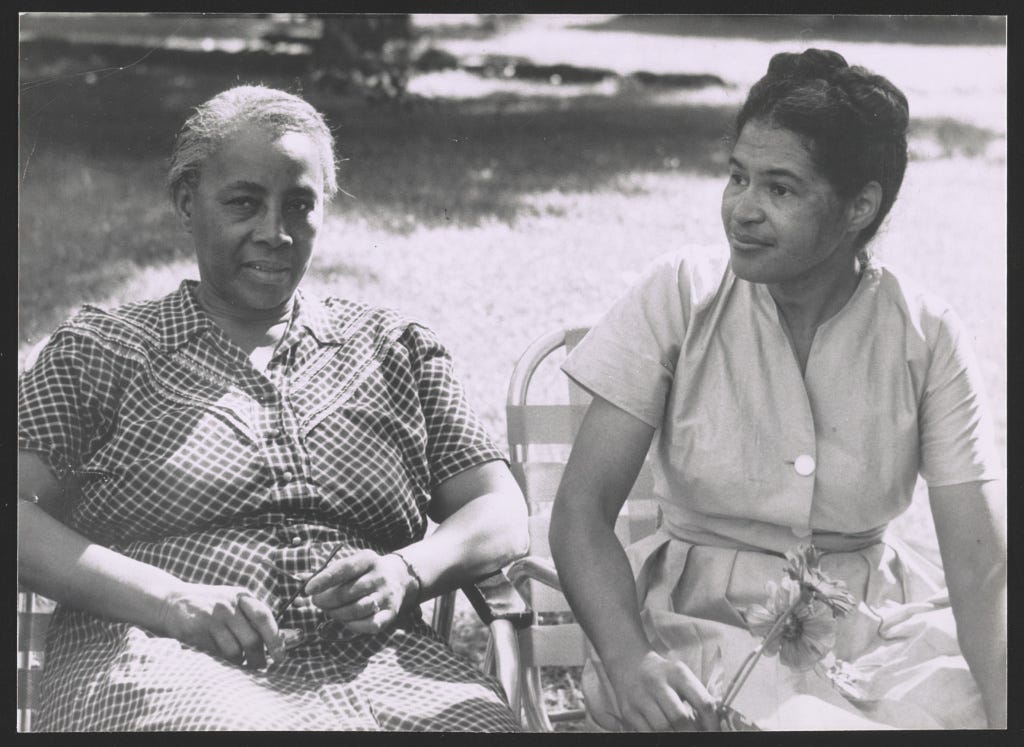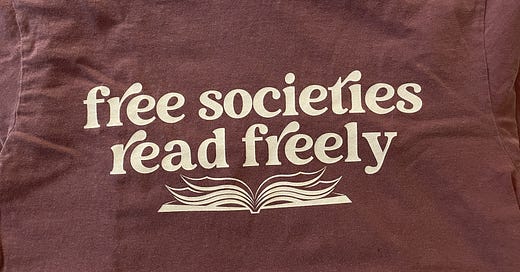I purchased a new t-shirt last month with the slogan “Free societies read freely.” When I wear it, most people assume it’s a statement against book banning.
It is.
Timely, since Banned Book Week is September 22-28. Given the recent surge in book bans, it’s a valuable time to tune into this issue. How many books that you’ve read have been banned? The American Library Association’s Office for Intellectual Freedom has lists of the top 10 most challenged books in each year back to 2001. If you don’t see familiar titles there, check the 100 most challenged books from 1990-1999, 2000-2009, or 2010-2019. If you’d like to know whether or how book bans are impacting your community, check with your local library.
Yet, the slogan on this t-shirt is about something bigger than book bans.
I wear it to remind people of a freedom they may not be exercising—either by not reading much at all, or by not exercising their freedom to read both familiar books, popular fiction, and content that echoes their current views, AND books that are unfamiliar or uncommon, and works that stretch or challenge their perspective.
When I introduce 10th-graders to the Question Formulation Technique or QFT, a strategy for leveraging the power of curiosity, I share a slide about when questioning tends to peak. Unlike reading and writing skills, which plateau in high school, the impulse to question reaches its apex around age 4 then drops steeply.
“Why do you think that is?” I ask. Students offer several theories. We’re learning a lot, so there’s less and less we’re curious about. People tell us to stop asking so many questions. We’re worried our questions are stupid. And so on. I ask if they’ve witnessed this pinnacle of questioning in any 3- to 5-year-olds they know. Smiles and nods. As you read this, you might be nodding too.
Then I explain the technique we’ll be using to tap into their curiosity about a topic they’re considering for their historical argument paper.
The first step of the QFT is producing questions, your own questions—without stopping to judge, edit, or answer them. We discuss which of these rules, like not stopping to answer questions, run counter to their habits. When they’re asked to submit a research question, many students pursue the first one that seems adequate so they can get on with answering it. As they hurtle from one assignment to the next, their curiosity slumps in the back row, its head on the desk.
Some students also predict it will be hard to stop themselves from judging their questions or erasing when they notice a spelling error. I encourage them to do their best to follow the rules and produce as many questions as they can.
“Ready, set, go!” I prompt, then circulate around the room as they write.
Three minutes later, when my iPhone alarm sounds, I say, “Stop.”
Later in the QFT process, each student selects one question from their list that strikes them as the most interesting so far and reflects on why they’re drawn to it. Some choose the first question they wrote down. Others choose the fifth or seventh.
As they organize their questions and anticipate what evidence they need to answer them, a strategy emerges. But what I hope lingers with them is that moment of awareness that more questions, including questions they might find more interesting, could be waiting inside them if they nudge their curiosity from its slumber and let it step to the front of the class—even for a measly three minutes.
What if each of us invited our curiosity to participate when we read, watch, or listen to news, or commentary we consume as if it’s news? If we shut off the TV, put down our smartphone, or take out our earbuds, what might we wonder about the topic in the silence? How many questions that bubble up would not be among those the podcaster, pundit, writer, or journalist asked?
Notice too, how encountering news or commentary makes you feel. Are you fired up, with reinforced convictions about how evil or stupid “those people” are on another patch of the American political quilt? Then what you consumed likely wasn’t news meant to inform. Instead, it was a brew of selectively spun details, maybe even a few verifiable facts, designed to trigger fear, anger, or another emotion to persuade you, often sparking that rush of dopamine-induced pleasure we feel when we consume something that confirms our viewpoint (UConn Today).
Finding that your emotions are involved isn’t necessarily a bad thing—as long as you’re aware it’s happening. During the QFT process, I ask students to sense how they’re feeling about their topic, seeing if they detect genuine curiosity about it, curiosity that could help them stay motivated if they encounter research difficulties, which they likely will.
I also want them to notice whether stronger emotions are at play. Their assignment is to assert a historical argument, so there must be some push and pull among historians about how the event is interpreted, and students must delve into those contrasts. If they’re feeling disdain or anger toward proponents of a certain interpretation, this may bias their search language, causing them to miss relevant sources. Bias could also arise if they’re feeling pride or sympathy for a relative who experienced the historical event. If asking questions about their topic sparks anxiety or fear, they may need to take steps to protect their wellbeing as they research—or choose a different topic.
Free societies read freely, including reading openly accessible government information and historical documents.
In America, we can access majority and dissenting opinions of Supreme Court rulings, pending legislation, executive orders, congressional floor debate, transcripts of Senate hearings, and other public records of our government’s activities. If a state or federal agency issues a report on wind energy, immigration, education, or housing, we can read it. Likewise, such agencies publish statistics on the open web that can reveal trends in everything from employment, inflation, crime, and military spending to sea levels, water quality, and wildfires. And as more libraries and archives digitize the historical documents in their collections, those are just a few clicks away too.
To some, this openly accessible information is a vast ocean beckoning to be explored. To others, it’s a firehose that knocks them off their feet or makes them want to leap out of its path. This is one reason that many folks—me included—often turn to policy analysts from advocacy groups or think tanks, historians, or journalists to select which details are important and explain what they mean. But if we sense that an excerpt from a newly signed law leaves out context that matters or suspect a statistic is being presented in a way that exaggerates the actual change, we can usually access the original source and read it for ourselves.
About 25 years ago, a group of organizers in Massachusetts developed the Question Formulation Technique (QFT) in the context of empowering parents to advocate for their children’s needs in public schools. My favorite quote in the introductory slide deck is from civil rights educator and advocate Septima Clark: “We need to be taught to study rather than to believe, to inquire rather than to affirm.” She saw inquiry as an essential component of civic engagement. I do too.

I’ve long wondered when, where, and why Septima Clark said those words, but I hadn’t looked it up. Writing this post gave me the perfect reason to pursue answers. Ideally, I wanted to track down an original document. After sifting through several results, including one that claimed it had been written on a Christmas card (which seemed odd), I found a handwritten copy of the speech that Septima Clark gave at Antioch in 1970 in which she asserted this belief. The document was digitized by the Lowcountry Digital Library. Click the image of the first page to access the rest of the text; the quote is on page seven in the point labeled number seven.
From a trusted source, here was the kind of evidence I’d hoped to find. Maybe she included it in a Christmas card message to someone too, but I couldn’t find any evidence of that. These dives into historical archives make me feel like a time traveler—but without Back to the Future wild hair or a charmed DeLorean.
What are your questions? Could an archive contain sources to inform your answer? What about current events? Do you have friends, relatives, or colleagues with a different political viewpoint than yours who tell you about headlines you haven’t heard? You could check the Blindspot feed from Ground News to see if it’s a story they highlight as missing from left or right-leaning media outlets. Or perhaps you’ve heard about the event, but without the same spin. Check AllSides or Ground News to access coverage about topics from the left, center, and right.
Or maybe you want to understand the background on a U.S. policy issue without someone telling you what stance to take. See if there’s a report about it from the Congressional Research Service, a team of librarians at the Library of Congress who write reports designed to bring our legislators up to speed on a wide range of policy issues without telling them how to vote.
Free societies read freely. Exercise that freedom by exploring your questions. If a resource I’ve mentioned is useful, great. If not, ask your local librarian for help.
My library’s slogan is Wonder. Research. Repeat. Questions help us convert wonder into action. Even if your curiosity has had its head on the desk for a while, tap it on the shoulder. When it wakes, the questions that emerge might surprise you.
Here’s a poem for your pocket until the next post: “I Sing the Body Electric” from Walt Whitman’s Leaves of Grass (1855). Although this “frank and sensual celebration of America and the human body” would later be considered a milestone in American poetry, organizations like the New York Society for the Suppression of Vice railed against the book, striving to stop it from being sold and getting the 1882 edition “banned in Boston” (Academy of American Poets).





Wendy - I am surprised that our questioning peaks at age 4 - I wonder if that is part of our cultures' struggle with science and more specifically climate change. Science seems based on the ability to ask questions and inquire as that wonderful quote from Septima Clark says. The counter pressure for children is also in her quote - the pressure to believe instead of inquire. Most of my questions as a child were about whether or not god existed. I suppose my questions were treated gently enough considering I was in East Tennessee at the time, but no one ever encouraged my questions about that. The expectation was that I would fall into line. Love this essay, Wendy. You gave me a lot to think about.